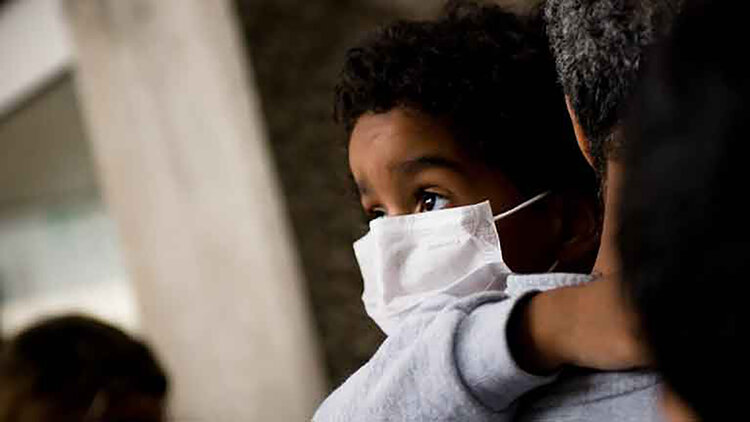As the Omicron variant was found in the state’s wastewater supplies, California Dec. 13 re-instituted a one month mask mandate at indoor public places, and recommended Covid testing for people attending “mega-events,” and after travelling out of the state.
“Requiring the indoor masking buys California time to learn more about Omicron, and is a chance to keep our guard up in a very purposeful and meaningful way during these critical weeks of celebration, without needing to do what some other countries have had to do: putting further restrictions on the things that we all miss,” said California Health and Human Services Secretary Dr. Mark Ghaly, at a Dec. 14 press conference jountly organized by Ethnic Media Services and California Black Media.
The mask mandate, which is in effect until Jan. 15, 2022, requires people to be masked at all indoor public spaces; on public transit; and healthcare settings. Masks are also required at K-12 schools, childcare, and other youth settings: the directive does not specifically state colleges and universities.
Masks are not required for fully-vaccinated employees indoors, but they are recommended, according to the directive issued by the California Department of Public Health. Several of the state’s biggest private companies have issued their own policies requiring vaccination before returning to the office.
Asked whether the mask mandate would prevail in regions of the state which have a deep anti-vaccination sentiment, Ghaly said: “We know at this moment in the pandemic that there’s going to be a lot of resistance, even non-compliance with masking requirements. I understand people are tired. People are fed up. People feel like this is really personal choice, but I will tell you, this is not just about one individual. This is about communities. This is about preserving the capacity of hospitals to support people.”
California saw a spike in cases in the week following the Thanksgiving holiday, reported Ghaly.
From Dec. 13-17, California is celebrating the first anniversary of the first Covid vaccination administered in the state. On. Dec. 14, 2020, California Governor Gavin Newsom looked on as Helen Cordova, an ICU nurse at Kaiser Permanente in Los Angeles, received her shot. “Historic,” tweeted Newsom, as Cordova took the jab.
“Today is really a celebration of how far we have come,” said Ghaly, noting that 61 million doses of the Covid vaccine have been administered. 85 percent of Californians are fully vaccinated, having received both doses of the Pfizer or Moderna vaccine, or the single-shot Johnson and Johnson vaccine.
Ghaly emphasized vaccine equity, noting that the state has worked hard to reach communities of color — where resources are often thinner — via faith-based organizations, and community ambassador initiatives. 70 percent of hard to reach communities have been vaccinated to date, he said.
The public health official addressed vaccine hesitancy, stating that the vaccines are absolutely safe and effective. “I will tell you that I’ve met many people who regret not being vaccinated in a timely way, but I have yet to meet anyone who regrets getting vaccinated. The sense of safety and security is real.”
People who are unvaccinated are 12 times more likely to be hospitalized with Covid-19 and 13 times more likely to die from Covid as somebody who is fully vaccinated, he noted.
Next year, 500 more school sites in low-income communities will be used as vaccine administration centers. Children 5 to 17 are currently eligible to receive only the Pfizer vaccine; those 18 and older are eligible for any vaccine.
Six million Californians have received boosters, which are available to anyone 16 or older who received a second shot of the Moderna or Pfizer vaccine more than six months ago; or two months after receiving the Johnson and Johnson vaccine.
Ghaly encouraged people to get boosted. “They boost up your immunity. The first two doses give quite a bit of protection. But then that third dose is like a super dose. It really jumps up your level of immunity, so that when you get exposed to Delta, or even Omicron, that booster will protect a little bit more around that variant.”
Addressing global vaccine equity, Ghaly stated: “Covid has always been a global challenge. Getting more citizens around the world vaccinated is going to help us reduce the likelihood of a variant popping up again in the future.”
“We need to lean in as a nation as a wealthy nation with resources to support other nations with less to get their populations vaccinated, not only to protect us, but mainly to protect our Global communities,” he said.
For the holidays, Ghaly recommended getting tested two days before meeting up with others and wearing a mask indoors at gatherings. He advised those who are even slightly sick to stay at home.
Home testing kits are available at local pharmacies.





